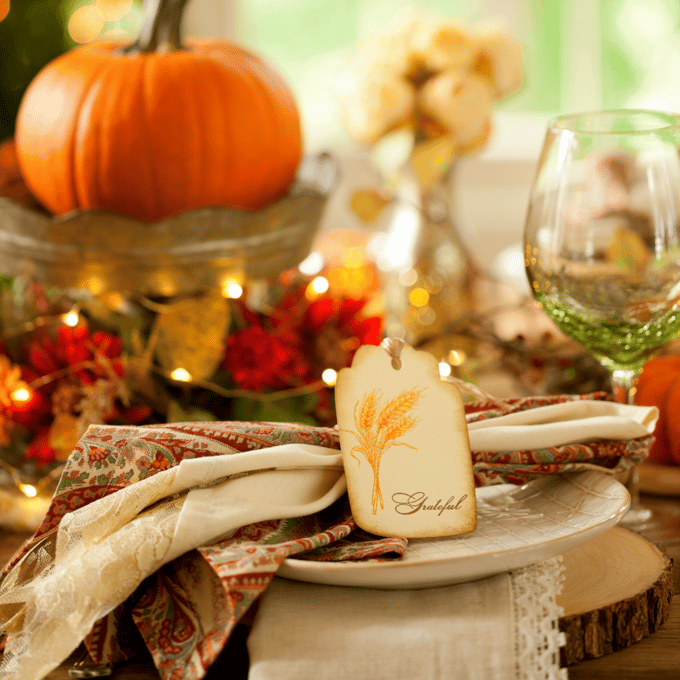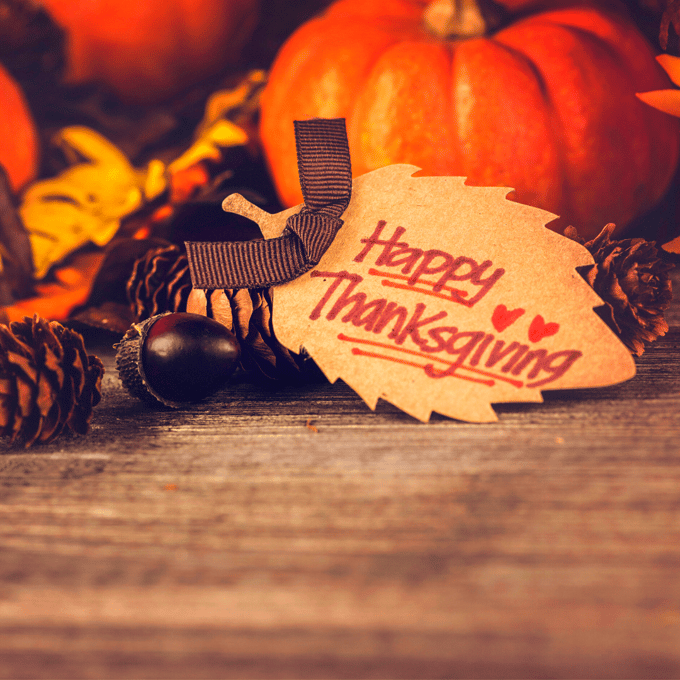Do you want to trade in the cultural stressed-out, food frenzy and instead experience Thanksgiving (and the surrounding days) as God intended? If so, I invite you to try out the two steps I use to create a simple yet celebratory Thanksgiving!
Below, I’ve outlined my own Thanksgiving plan (which includes a three-day stay at my parents' home with my husband and two teenage sons) that you can use to create the kind of holiday you actually look forward to.
Two Steps
- Describe the Thanksgiving you would like to have in three words.
- For each of those descriptors to come to fruition, make a list of what needs to happen.
My Thanksgiving Plan
Step One:
The three words I chose to describe my Thanksgiving are:
- present
- connected
- peaceful
Step Two:
For those words to come to fruition, here is what needs to happen.
Present
For me to be present in the moment, I must plan my food. Otherwise, as I am an emotional eater, food will occupy my thoughts and distract me from living in the moment. These are the general guidelines that I will use to create my food plan. I also recommend them to other women who struggle with emotional eating.
- Eat at regular intervals. Plan to eat regular meals before and after the main Thanksgiving meal (they may be smaller, but I don’t restrict them throughout the day to “allow” for overeating). Knowing I will have a meal 3-4 hours after my Thanksgiving meal quiets the fear of “not getting enough” during the main meal.
- Choose favorites. Decide what you LOVE and what you could leave. Beware of “food lies,” like “this is the only time I can have (fill in the blank).” The truth is that it’s 2022, and most of us can either purchase or cook any food item at any time.
- Don’t eat out of obligation. Eat the food you want, not because you think it would please someone else. When offered food I didn’t plan, I politely say “no, thank you” and repeat those 3 words as often as I am offered. Remember, my goal is to stay present and not be distracted by “regret” or believe the lie that someone made me eat something.
- I ALWAYS have the power of choice, and no one puts food in my mouth.
- In summary, I plan the food I LOVE, and that makes me feel really good about myself.
Some other self-care practices I follow with food that help me stay present include:
- Eating while seated, not standing.
- Eating from a plate prepared for me, not picking off trays. I put the appetizers I want on a plate (I plan how many times I will “fill up” the plate). That way, I live in truth about how much I eat, so I don’t mindlessly eat. As an emotional eater, mindless eating prevents feeling present in the moment because later, I’m calculating how much I ate. Remember, staying present is one of my goals.

Connected
Being “connected” means feeling connected to God, to myself, and to the people around me. To be connected to others, I want to look at and really listen to them, in addition to having fun through games or walks. To stay connected to myself, I eat slowly and mentally check in a few times throughout the day. To eat slowly, I follow a few habits:
- I chew each bite 20+ times
- I empty my hands while I’m chewing
- I wait to take the next bite until my mouth is empty
To do mental check-ins, I pause to ask myself,
- “What am I feeling?” and
- “What do I need?”
- This helps prevent the overwhelm that leads to exhaustion, unnecessary stress, and mindless overeating.
Taking breaks alone to read or journal provides an opportunity to connect with God. This short yet powerful practice is the only way I am able to stay connected to God throughout the day. As an introvert, I get overstimulated around others, so taking 5—to 10-minute breaks alone allows me to reset and connect with God.

Peaceful
Peaceful is the final word I want to describe Thanksgiving, and it doesn’t mean boring or quiet to me. In fact, when I am peaceful, I have more fun! The “peace” I am referring to here is simply accepting life on life’s terms and being content with the way things are.
This applies to people and situations. That means giving others the dignity and respect to be who they are, make their own decisions, and have their own opinions. I can’t have peace on holidays if I engage in heated debates or get offended by others’ comments. I have no idea what opportunity God will give to me this Thanksgiving for me to practice returning to peace when I find my “feathers ruffled,” but I know a few things:
- I can always leave a room.
- I can always find somewhere quiet to breathe and calm down.
- Excess food will NEVER make a situation better. It will only add to negative feelings by adding regret and feeling horrible about myself. I try really hard to avoid doing things that make me feel horrible about myself.

Intentionally co-creating with God the Thanksgiving you want by describing it in three words and then listing what you need to bring that vision to life is a path to a sane yet celebratory holiday!